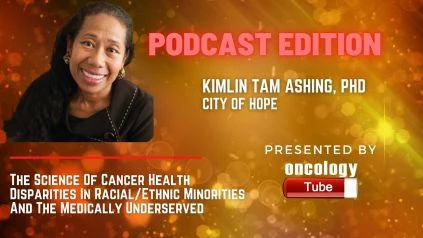Kimlin Tam Ashing, PhD, professor in the Department of Population Sciences at City of Hope speaks about The Science Of Cancer Health Disparities In Racial/Ethnic Minorities And The Medically Underserved.
Link to Article:
https://www.onclive.com/view/clinical-trial-diversity-efforts-gain-steam
The NIH Revitalization Act of 1993 requires that women and members of racial and ethnic minorities be recruited for all NIH-sponsored clinical trials, with enough participants in subpopulations, particularly in phase 3 research, to assess any genuine disparities in outcomes. Researchers who applied for NIH grants were obliged to implement outreach initiatives to guarantee that those objectives were realized.
However, when it comes to minorities with cancer, the law has fallen short of expectations. A demographic disparity persists nearly 30 years after the National Institutes of Health attempted to expand minority participation in clinical trials. According to the FDA, 73 percent of the 4922 patients who took part in clinical studies that resulted in the approval of 18 novel oncology medications in 2020 were White, 14 percent were Asian, 6 percent were Hispanic, and 5 percent were Black or African American.
The COVID19 pandemic, on the other hand, has shed new light on health-care discrepancies, while racial justice rallies have heightened the intensity of the debate, according to experts. A recent flurry of events demonstrates renewed impetus for expanding access to clinical trials—and cancer care in general—for Black and Hispanic patients, as well as other underrepresented groups. The following are some of the recent developments:
Investigators at the Dana-Farber Cancer Institute in Boston, Massachusetts, collaborated with experts from the FDA and the American Association for Cancer Research to develop a “road map” for designing multiple myeloma (MM) clinical trials that include more African American patients (AACR).
3 The proposal is based on study findings that reveal the number of African Americans enrolling in select MM trials decreased by 3.5 percent from 2002 to 2011, despite the fact that the malignancy’s incidence and mortality rates are greater in African Americans than in White patients.Â
Starting in 2022, state Medicaid programs would be required to reimburse ordinary patient costs for participation in eligible clinical trials, including for cancer indications, under a large COVID-19 relief and government funding package agreed by Congress in December 2020. The lack of Medicaid coverage has hampered minority and low-income recruitment.Â
The American Association for Cancer Research (AACR) will produce its first full report in September 2020, which will explain healthcare discrepancies and serve as a call to action for cancer patients, including expanding clinical trial enrolment among minorities.
Hospital partnerships with community centers and clinical practices to serve patients in their communities to boost clinical trial participation are new methods for expanding access to clinical trials for minorities.

